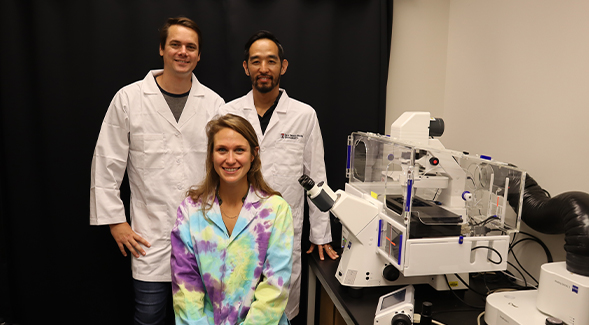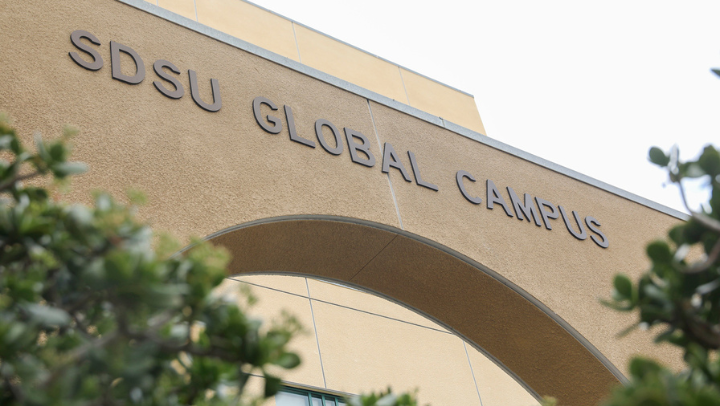From Ships to Syringes
Biologist Nick Shikuma and his former Ph.D. students are set to launch a biotech startup thanks to SDSUs Innovation Corps program.

The article first published in the 2022 edition of Highlights: A Magazine of Research, Scholarship and Creative Activities at SDSU.
Imagine a syringe that’s small enough to inject cells with whatever proteins you desire. With the potential to revolutionize scientific experiments in academia and industry, biologist Nick Shikuma is leveraging an injection mechanism and its ability to genetically modify other organisms to start a biotechnology company.
But entrepreneurship definitely was not on Shikuma’s radar when he received a grant from the Office of Naval Research to reduce the more than $180 million they spend on removing marine organisms from ships’ hulls. Upon discovering that ship-sticking tubeworms grow into their adult form thanks to a bacterium injecting its own proteins, Shikuma and his now-graduated doctoral students Kyle Malter (‘22) and Amanda Alker (‘22) sought resources to help share these findings beyond the lab.
San Diego State University’s Technology Transfer Office managed the filing of patent applications based on the results of their research, connected the researchers with expert biotechnology industry mentors, and advised them on business models and product offerings.
“Once we had the intellectual property, we were interested in figuring out how it could be commercialized,” said Malter, who wanted to become an entrepreneur at a very early age. “When the idea came up to do I-Corps, I was like, ‘Heck yeah! Let’s see what we can do with this.’”
Malter and Shikuma completed SDSU’s semester-long Innovation Corps (I-Corps) program, led by Stanley Maloy, a microbiologist and former associate vice president for innovation.
Something Maloy said stuck with Shikuma: “It’s great that you’re an academic and that you can make foundational discoveries. But it’s also nice to have some kind of societal impact if you can.”
Valuable Help
Hearing from the I-Corps instructors, who themselves were scientists, about their missteps and successes in starting companies was instrumental in helping Shikuma and his team think through the next steps for their venture, Metamorphotech. I-Corps helped them identify the milestones needed to advance their technology toward commercial readiness. Shikuma was awarded funding from the SDSU Pilot Innovation Fund to help them along the road to commercialization.
“The Metamorphotech team is a wonderful example of how a surprising basic science discovery can be adapted to solve complex problems in a wide variety of areas, from marine sciences to agriculture to human health,” said Maloy. “This transition from a laboratory discovery to a product that benefits society requires an understanding of how to be a successful entrepreneur, approaches that are taught in our NSF-funded I-Corps program. The Metamorphotech team quickly embraced these concepts.”
Named after the lab’s initial focus on the biology of transformative processes, the Metamorphotech team continue to hone their initial product offerings.
The team plans to provide gene-editing services and custom strains of marine bacteria for fellow academics who are hindered by the challenging, time-consuming process of genetically modifying their own microorganisms besides E.coli and yeast. Further along their journey, they’ll adapt the bacteria’s nanosyringe to inject medicinal drugs into a variety of cell types.
“I like the freedom of starting a company,” said Malter, “When you have control over what you’re doing, it makes it a lot easier to have a passion for it. It’s easier to steer the ship because no one else is going to do it.”



